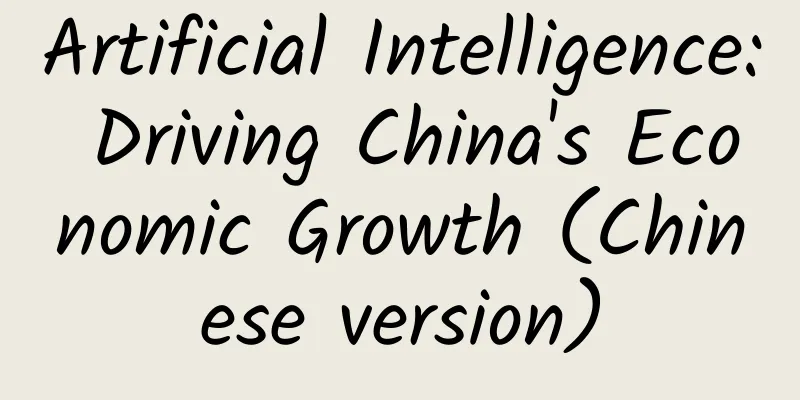Artificial Intelligence: Driving China's Economic Growth (Chinese version)

|
The report, titled "Artificial Intelligence: Powering China's Economic Growth," delves into the impact of artificial intelligence technology on China's economy. According to a modeling analysis conducted jointly by Accenture and Economic Frontiers, when artificial intelligence is used as a new factor of production rather than just a productivity enhancement tool, it has the potential to bring huge growth opportunities to China's economy. The study compared the size of China's economy in 2035 as a baseline scenario (i.e., the expected economic growth under current conditions) with the AI effect scenario (i.e., the expected economic growth under full application of AI). Accenture found that as a new factor of production, AI has the potential to increase China's total economic value added by $7.111 trillion in 2035. The report also found that AI is expected to boost China's labor productivity by 27% by 2035, thanks to AI helping employees use their time more efficiently. “China has made tremendous progress in AI, and our research shows that AI has the potential to boost China’s currently slowing economic growth,” said Chuan Neo Chong, chairman of Accenture Greater China. “Of course, as with any transformative technology, we should also be aware of the challenges and risks that AI brings. Stakeholders should prepare for a future led by AI in terms of intellectual, technical, political, ethical and social aspects.” The report found that AI could spark economic growth in three ways:
Based on the simulation analysis of the overall impact of artificial intelligence on China's economy and combined with industry scale data, Accenture further interpreted the possible economic impact of artificial intelligence on 15 industries in China. The research shows that manufacturing, agriculture, forestry and fishery, and wholesale and retail will become the three industries that benefit the most from the application of artificial intelligence. By 2035, artificial intelligence will drive the annual growth rates of these three industries to increase by 2%, 1.8% and 1.7% respectively. “Artificial intelligence will change the future of every industry in China,” said Xiaobing Chen, president of Accenture Greater China Information Technology Services. “To realize its full potential, business leaders need to incorporate artificial intelligence into their development strategies, which means adjusting their corporate structures to fully utilize artificial intelligence and thinking more innovatively about their operations and business models. Ultimately, companies need to shift from adopting new ways of working to opening up new business areas.” To fully realize the potential of AI to stimulate economic growth and revitalize industries in China, Accenture recommends that Chinese policymakers and business leaders take the following steps:
You can join our small circle by downloading the PDF version. 199IT thanks you for your support! |
<<: Will VR be the future of gaming? Can virtual reality technology open up new ideas for gaming?
>>: Artificial intelligence is getting smarter, should we give AI human rights?
Recommend
IE abandoned: open source monopoly is a good monopoly
Microsoft IE is about to die. A series of browser...
21-day writing boot camp: let you make money by writing, you can start writing even if you have no basic knowledge, and have an additional side job to earn money while lying down at home!
21-day writing boot camp: let you make money by w...
Dog walking mini program development function, how much does it cost to make a WeChat pet mini program?
Nowadays, people's lives are becoming more an...
35 essential lessons for novices in live streaming: the entire process from a novice to live streaming, a set of systematic live streaming methodology
35 essential lessons for novices in live streamin...
5 ways to quickly understand your users
When doing operations work, you often need to sta...
Case: Why McDonald's and KFC are always opened next to each other
First, let me tell you a story: There was a pair ...
How much is the investment price for the Shigatse agricultural products mini program? Shigatse Agricultural Products Mini Program Merchant Price Inquiry
How much does it cost to attract investment for t...
WeChat keyboard protects personal privacy: it just takes up too much storage space on your phone
WeChat, as a social software, is widely popul...
How much radiation does the body absorb when taking a "film"? The truth is...
When at work: Computer radiation is very strong W...
Beidou is officially launched. Why do we build Beidou?
Beidou officially launched Today (July 31), the c...
Zhou Zhonghe, academician of the Chinese Academy of Sciences: Humanistic spirit is the "soul" of popular science
Academician Zhou Zhonghe 【Interview with Academic...
E-commerce game design and planning methods (Part 1)
The era of content-based e-commerce has quietly a...
8 tips to teach you how to make good use of KOL!
Although routines are necessary, you must also be...
Why do most startup marketing fail?
The author of this article will explain the mista...
The third generation Honda CONNECT is officially launched
On March 22, Honda Motor (China) Investment Co., ...









